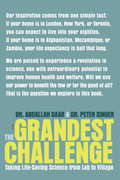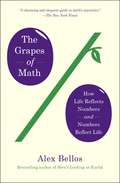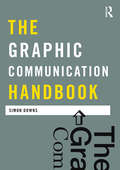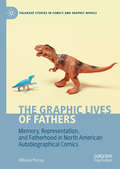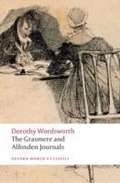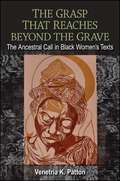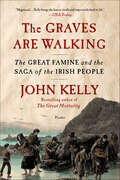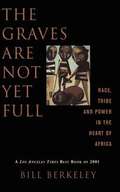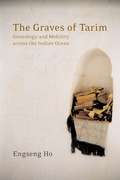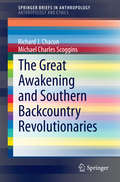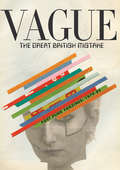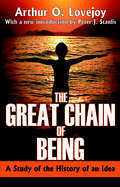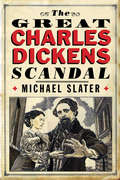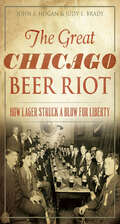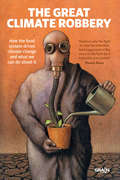- Table View
- List View
The Grandest Challenge
by Peter Singer Abdallah DaarThe health-sciences equivalent of Thomas Friedman's bestseller The World is Flat, this inspiring and revelatory book by two of today's finest scientists shows how advances in global health will transform lives -- particularly in the developing world -- over the next decade.The Grandest Challenge begins with a simple premise: that every person's life is of equal value, regardless of where in the world he or she lives. It also begins with a simple, alarming fact: in this age of spectacular scientific advances, it is still those who live in the developed world -- in the West -- who benefit most from our enormous power to combat disease, and those in the developing world who are most likely to die for lack of basic, inexpensive care and nutrition.In this revelatory book, distinguished scientists Abdallah Daar and Peter Singer argue that the revolution in biotechnology can save millions of lives -- but only if we find a way to bring knowledge and treatments out of state-of-the-art labs and into the world's most remote villages. The doctors lead us on an eye-opening, globe-spanning tour, showing us in vivid detail how developing countries can and are breaking the cycle of dependence, exchanging knowledge, and creating solutions that work for their own people as well as the rest of us.From the Hardcover edition.
The Grandissimes
by George Washington Cable Michael KreylingSetting forth formidable arguments for racial equality, Cable's novel of feuding Creole families in early nineteenth-century New Orleans blends post-Civil War social dissent and Romanticism.
The Grantseeker's Guide to Winning Proposals
by Judith B. Margolin Elan K. DimaioPublished for development officers, nonprofit board members, fundraising consultants, and others in pursuit of grants from U.S. foundations, this guide provides real-world proposals that resulted in funding for a variety of needs, including general operating support, program development, staff salaries, and program evaluation. The featured proposals request anywhere from $5,000 to $500,000 in funding and were approved by international grantmakers such as the Charles Stewart Mott Foundation, large regional funders such as the Robert W. Woodruff Foundation, corporate donors such as the Mitsubishi Electric America Foundation, and local funders (including family foundations).
The Grapes of Math: How Life Reflects Numbers and Numbers Reflect Life
by Alex BellosFrom triangles, rotations and power laws, to cones, curves and the dreaded calculus, Alex takes you on a journey of mathematical discovery with his signature wit and limitless enthusiasm. He sifts through over 30,000 survey submissions to uncover the world's favourite number, and meets a mathematician who looks for universes in his garage. He attends the World Mathematical Congress in India, and visits the engineer who designed the first roller-coaster loop. Get hooked on math as Alex delves deep into humankind's turbulent relationship with numbers, and reveals how they have shaped the world we live in.
The Graphic Communication Handbook (Media Practice)
by Simon DownsThe Graphic Communication Handbook is a comprehensive and detailed introduction to the theories and practices of the graphics industry. It traces the history and development of graphic design, explores issues that affect the industry, examines its analysis through communications theory, explains how to do each section of the job, and advises on entry into the profession. The Graphic Communication Handbook covers all areas within the industry including pitching, understanding the client, researching a job, thumbnail drawings, developing concepts, presenting to clients, working in 2D, 3D, motion graphics and interaction graphics, situating and testing the job, getting paid, and getting the next job. The industry background, relevant theory and the law related to graphic communications are situated alongside the teaching of the practical elements. Features include: introductions that frame relevant debates case studies, examples and illustrations from a range of campaigns philosophical and technical explanations of topics and their importance.
The Graphic Lives of Fathers: Memory, Representation, and Fatherhood in North American Autobiographical Comics (Palgrave Studies in Comics and Graphic Novels)
by Mihaela PrecupThis book explores the representation of fatherhood in contemporary North American autobiographical comics that depict paternal conduct from the post-war period up to the present. It offers equal space to autobiographical comics penned by daughters who represent their fathers’ complicated and often disappointing behavior, and to works by male cartoonists who depict and usually celebrate their own experiences as fathers. This book asks questions about how the desire to forgive or be forgiven can compromise the authors’ ethics or dictate style, considers the ownership of life stories whose subjects cannot or do not agree to be represented, and investigates the pervasive and complicated effects of dominant masculinities. By close reading these cartoonists’ complex strategies of (self-)representation, this volume also places photography and archival work alongside the problematic legacy of self-deprecation carried on from underground comics, and shows how the vocabulary of graphic narration can work with other media and at the intersection of various genres and modes to produce a valuable scrutiny of contemporary norms of fatherhood.
The Grasmere and Alfoxden Journals
by Dorothy Wordsworth Pamela WoofDorothy Wordsworth's journals are a unique record of her life with her brother William, at the time when he was at the height of his poetic powers. Invaluable for the insight they give into the daily life of the poet and his friendship with Coleridge, they are also remarkable for their spontaneity and immediacy, and for the vivid descriptions of people, places, and incidents that inspired some of Wordsworth's best-loved poems. The Grasmere Journal was begun at Dove Cottage in May 1800 and kept for three years. Dorothy notes the walks and the weather, the friends, country neighbors and beggars on the roads; she sets down accounts of the garden, of Wordsworth's marriage, their concern for Coleridge, the composition of poetry. The earlier Alfoxden Journal was written during 1797-8, when the Wordsworths lived near Coleridge in Somerset. Not intended for publication, but to "give Wm Pleasure by it," both journals have a quality recognized by Wordsworth when he wrote of Dorothy that "she gave me eyes, she gave me ears."
The Grasp That Reaches beyond the Grave: The Ancestral Call in Black Women's Texts
by Venetria K. PattonThe Grasp That Reaches beyond the Grave investigates the treatment of the ancestor figure in Toni Cade Bambara's The Salt Eaters, Paule Marshall's Praisesong for the Widow, Phyllis Alesia Perry's Stigmata and A Sunday in June, Toni Morrison's Beloved, Tananarive Due's The Between, and Julie Dash's film, Daughters of the Dust in order to understand how they draw on African cosmology and the interrelationship of ancestors, elders, and children to promote healing within the African American community. Venetria K. Patton suggests that the experience of slavery with its concomitant view of black women as "natally dead" has impacted African American women writers' emphasis on elders and ancestors as they seek means to counteract notions of black women as somehow disconnected from the progeny of their wombs. This misperception is in part addressed via a rich kinship system, which includes the living and the dead. Patton notes an uncanny connection between depictions of elder, ancestor, and child figures in these texts and Kongo cosmology. These references suggest that these works are examples of Africanisms or African retentions, which continue to impact African American culture.
The Grass Ceiling: On Being a Woman in Sport
by Eimear Ryan'A book which will very soon be acknowledged as a classic of Irish sportswriting' Ciarán MurphyWhat is it like to be female in a male-dominated sporting world? If you play with the boys, more people pay attention - but you get treated like an alien. Playing with other girls or women means you have to accept smaller audiences, diminished status and - for professionals - lower pay.And what if, as is the case for camogie player Eimear Ryan, your sport has a completely different name when women play it? What if you don't feel entirely comfortable in an all-female sporting environment because you're shy, bookish, not really one of the girls?In The Grass Ceiling, acclaimed novelist Eimear Ryan digs deep into the confluence of gender and sport, and all the questions it throws up about identity, status, competition and self-expression. At a time when women's sport is on the rise but still a long way from equality, it is a sharp, nuanced and heartfelt exploration of questions that affect everyone who loves sport.Praise for The Grass Ceiling'A gorgeous memoir about a life lived in sport, specifically a female, Irish rural life. I read it in two sittings.' Malachy Clerkin, Irish Times'A love letter to the GAA and a diatribe against the idea sport is not for women' Kathleen McNamee, Irish Times'Brilliant ... Ryan's bold and deep search into so many of those internalised questions provides a fascinating collage of emotional detail' Christy O'Connor, Irish Examiner 'Lyrical, urgent, wise and bracing' Irish Times
The Graves Are Walking: The Great Famine and the Saga of the Irish People
by John Kelly“Though the story of the potato famine has been told before, it’s never been as thoroughly reported or as hauntingly told.” —New York PostIt started in 1845 and before it was over more than one million men, women, and children would die and another two million would flee the country. Measured in terms of mortality, the Great Irish Potato Famine was the worst disaster in the nineteenth century—it claimed twice as many lives as the American Civil War. A perfect storm of bacterial infection, political greed, and religious intolerance sparked this catastrophe. But even more extraordinary than its scope were its political underpinnings, and The Graves Are Walking provides fresh material and analysis on the role that Britain’s nation-building policies played in exacerbating the devastation by attempting to use the famine to reshape Irish society and character. Religious dogma, anti-relief sentiment, and racial and political ideology combined to result in an almost inconceivable disaster of human suffering.This is ultimately a story of triumph over perceived destiny: for fifty million Americans of Irish heritage, the saga of a broken people fleeing crushing starvation and remaking themselves in a new land is an inspiring story of revival.Based on extensive research and written with novelistic flair, The Graves Are Walking draws a portrait that is both intimate and panoramic, that captures the drama of individual lives caught up in an unimaginable tragedy, while imparting a new understanding of the famine’s causes and consequences.“Magisterial . . . Kelly brings the horror vividly and importantly back to life with his meticulous research and muscular writing. The result is terrifying, edifying and empathetic.” —USA Today
The Graves are Not Yet Full
by Bill BerkeleyAccount of the causes behind the Rwandan genocide of 1994.
The Graves of Tarim: Genealogy and Mobility Across the Indian Ocean
by Engseng HoThe Graves of Tarim narrates the movement of an old diaspora across the Indian Ocean over the past five hundred years. Ranging from Arabia to India and Southeast Asia, Engseng Ho explores the transcultural exchanges--in kinship and writing--that enabled Hadrami Yemeni descendants of the Muslim prophet Muhammad to become locals in each of the three regions, yet remain cosmopolitans with vital connections across the ocean.
The Gray Zone: Sovereignty, Human Smuggling, and Undercover Police Investigation in Europe (Anthropology of Policy)
by Gregory FeldmanBased on rare, in-depth fieldwork among an undercover police investigative team working in a southern EU maritime state, Gregory Feldman examines how "taking action" against human smuggling rings requires the team to enter the "gray zone", a space where legal and policy prescriptions do not hold. Feldman asks how this seven-member team makes ethical judgments when they secretly investigate smugglers, traffickers, migrants, lawyers, shopkeepers, and many others. He asks readers to consider that gray zones create opportunities both to degrade subjects of investigations and to take unnecessary risks for them. Moving in either direction largely depends upon bureaucratic conditions and team members' willingness to see situations from a variety of perspectives. Feldman explores their personal experiences and daily work in order to crack open wider issues about sovereignty, action, ethics, and, ultimately, being human. Situated at the intersection of the EU migration apparatus and the global, clandestine networks it identifies as security threats, this book allows Feldman to outline an ethnographically-based theory of sovereign action.
The Great Arizona Orphan Abduction
by Linda GordonThis text tells the disturbing history of racial boundaries along the USA/Mexican border. It focuses on the case of some Irish orphans who were placed with Mexican families, and the resulting anger of the town's Anglos who formed a vigilante squad to kidnap the children away from the Mexicans.
The Great Awakening and Southern Backcountry Revolutionaries
by Richard J. Chacon Michael Charles ScogginsThis work documents the impact that the Great Awakening had on the inhabitants of colonial America's Southern Backcountry. Special emphasis is placed on how this religious revival furrowed the ground on which the seeds of the American Revolution would sprout. The investigation shows how the Great Awakening can be traced to the Europe's Age of Enlightenment. This effort also demonstrates how and why this revival spread so rapidly throughout the colonies. Special focus is placed on how the Great Awakening impacted the mindset of colonists of the Southern Backcountry. Most significantly, this research demonstrates how this 18thcentury revival not only cultivated a sense of American national identity, but how it also fostered a colonial mindset against established authority which, in turn, facilitated the success of the American Revolution. Additionally, this investigation will document (from a cross-cultural perspective) how religious revivals have fueled other revolutionary movements around the world. Such analysis will include the Celtic Druid Revolt, the Maji-Maji Rebellion of East Africa along with the Mad Man's War in Southeast Asia. Lastly, the ethical ramifications of minimizing (or denying) the role that religion played in political and social transformations around the world will be addressed. This final point is of paramount importance given current trend in academia to minimize the role that religion played in spurring revolutions while emphasizing material (i. e. economic) causal factors. This attempt at divorcing religion from history is misguided and unethical because it is not only misleading but it also fails to fully acknowledge the beliefs and values that motivated individuals to take certain actions in the first place.
The Great Awakening: Defeating the Globalists and Launching the Next Great Renaissance
by Kent Heckenlively Alex JonesIn The Great Awakening: Defeating the Globalists and Launching the Next Great Renaissance, the most persecuted man on Earth, Alex Jones, gives you the good news about the failing plans of the globalists to control humanity. The expression &“Get woke, go broke&” has entered the common lexicon as we&’ve seen company after company invoke the false gods of diversity, equity, and inclusion to their financial demise. But this surface discussion masks a much darker truth. What we are witnessing is nothing less than the failed plans of social Darwinists to capture free market capitalism and turn it toward their fascist aims of controlling and depopulating the globe. Working with New York Times bestselling author Kent Heckenlively, Jones masterfully gives you the deeper discussion about such hot button topics as the truth behind the globalists plans for artificial intelligence (AI), the central bank digital currency, social credit scores, Big Tech tyranny, censorship, fifteen-minute cities, the unholy alliance between big business and big government, the military-intelligence-industrial complex—which is hell-bent on eternal war—and the all-out assault on free speech and the Second Amendment. The good news is that these plans are destined to fail, if we wake up to the anti-human future the globalists have planned for us. The globalists hate freedom, and what they hate the most is the greatest freedom document in human history, the United States Constitution. Jones does not shy away from the darker parts of American history—the way we have been systematically deceived by the intelligence agencies since their assassination of President John F. Kennedy—but he provides example after example of people who have broken free from the matrix of lies to tell the truth. The people the globalists fear the most are the members of their own systems of control, who wake up and then decide to act against the machine. The globalists believe they&’ve planned for every possible contingency, but they hadn&’t counted on the conscience and love of truth, which lives in the souls of good people. St. Augustine once wrote: &“The truth is like a lion; you don&’t have to defend it. Let it loose; it will defend itself.&” No figure in our modern times has roared louder against the enemies of freedom than Alex Jones. In the calm and dispassionate style that made his first book, The Great Reset: And the War for the World, such a smash hit, Alex lays out the flaws in the plans of the globalists and how they seek to create a world in direct opposition to God&’s plans for our glorious human future. But God consistently works His will in our world, even through imperfect individuals like Donald Trump, Alex Jones, or you. If you want to read one book this year to understand your world and help lead humanity to the next great human renaissance, you need to order this book today.
The Great Book of Hemp: The Complete Guide to the Environmental, Commercial, and Medicinal Uses of the World's Most Extraordinary Plant
by Rowan RobinsonHemp, Cannabis sativa, has been called the world's most versatile plant. Materials made from hemp fiber have been discovered in tombs dating back to 7000 B.C. During the Middle Ages hemp was used to treat fevers, insomnia, and malaria. Columbus's ships had sails of hemp, and during colonial times it was universally grown because its strong fibers made superior ropes, sails, cloth, and paper. In fact, hemp was used for money in most of the Americas from 1631 until the early 1800s, and the original drafts of the Declaration of Independence and the Constitution were written on hemp paper.As a food, the oil from hemp seeds has the highest percentage of essential fatty acids and the lowest percentage of saturated fats. Britain and Canada have recently lifted bans on growing industrial hemp and today it is reappearing in the marketplace in an amazing array of products: from lip-salve, jeans, salad oil, and cheese to paper products, composite fiberboard, and biomass fuel.This illustrated, easy-to-read guide covers all aspects of hemp:• The history of its cultivation worldwide • Its role as a source of renewable energy and as an alternative for paper manufacturing and fossil fuels• Its versatility as a fiber• Its many nutritional and medicinal uses• Examines the physiological and psychological effects of marijuana use in recreation and therapy• A comprehensive resource section includes information on organizations involved in legalizing hemp, product suppliers, and an annotated bibliography.
The Great British Mistake: 1979-84
by Tom Vaguehttp://www.breadandcircusespublishing.com/home/vague.html
The Great Caliphs: The Golden Age Of The 'abbasid Empire
by Amira K. BennisonIn this accessibly written history, Amira K. Bennison contradicts the common assumption that Islam somehow interrupted the smooth flow of Western civilization from its Graeco-Roman origins to its more recent European and American manifestations. Instead, she places Islamic civilization in the longer trajectory of Mediterranean civilizations and sees the 'Abbasid Empire (750-1258 CE) as the inheritor and interpreter of Graeco-Roman traditions. At its zenith the 'Abbasid caliphate stretched over the entire Middle East and part of North Africa, and influenced Islamic regimes as far west as Spain. Bennison's examination of the politics, society, and culture of the 'Abbasid period presents a picture of a society that nurtured many of the "civilized" values that Western civilization claims to represent, albeit in different premodern forms: from urban planning and international trade networks to religious pluralism and academic research. Bennison's argument counters the common Western view of Muslim culture as alien and offers a new perspective on the relationship between Western and Islamic cultures.
The Great Cauldron: A History of Southeastern Europe
by Marie-Janine CalicWe often think of the Balkans as a region beset by turmoil and backwardness, but from late antiquity to the present it has been a dynamic meeting place of cultures and religions. Marie-Janine Calic invites us to reconsider the history of this intriguing, diverse region as essential to the story of global Europe.
The Great Chain of Being: A Study of the History of an Idea
by Arthur LovejoyThis is arguably the seminal work in historical and philosophical analysis of the twentieth century. Originally delivered for the William James lecture series at Harvard University in 1932-33, it remains the cornerstone of the history of ideas. Lovejoy sees philosophy's history as one of confusion of ideas, a prime example of which is the idea of a "great chain of being"--a universe linked in theology, science and values by pre-determined stages in all phases of life.Lovejoy's view is one of dualities in nature and society, with both error and truth as part of the natural order of things. The past reminds us that the ruling modes of thought of our own age, which we may view as clear, coherent and firmly grounded, are unlikely to be seen with such certainty by posterity. The Great Chain of Being is an excursion into the past, with a clear mission--to discourage the assumption that all is known, or that what is known is not subject to modifi cation at a later time.Lovejoy reaffirms the "intrinsic worth of diversity," as a caution against certitude. By this he does not mean toleration of indiff erence, or relativity for its own sake, but an appreciation of mental and physical process of human beings. As Peter Stanlis notes in his introduction: "Faith in the great chain of being was fi nally largely extinguished by the combined infl uences of Romantic idealism, Darwin's theory of evolution, and Einstein's theory of relativity." Few books remain as alive to prospects for the future by reconsidering follies of the past as does Lovejoy's stunning work.
The Great Charles Dickens Scandal
by Michael SlaterThe true story of the sensational rumors surrounding the Victorian author—and the attempts to cover them up: &“Riveting . . . a scholarly detective story&” (The Boston Globe). Charles Dickens was regarded as the great proponent of hearth and home in Victorian Britain, but in 1858 this image was nearly shattered. With the breakup of his marriage that year, rumors of a scandalous relationship he may have conducted with the young actress Ellen &“Nelly&” Ternan flourished. For the remaining twelve years of his life, Dickens managed to contain the gossip. After his death, surviving family members did the same. But when the author&’s last living son died in 1934, there was no one to discourage rampant speculation. Dramatic revelations came from every corner—over Nelly&’s role as Dickens&’s mistress, their clandestine meetings, and even his possibly fathering an illegitimate child. This book presents the most complete account of the scandal and ensuing cover-up ever published. Drawing on the author's letters and other archival sources not previously available, Dickens scholar Michael Slater investigates what Dickens did or may have done, then traces the way the scandal was elaborated over succeeding generations. Slater shows how various writers concocted outlandish yet plausible theories while newspapers and book publishers vied for salacious information. With its tale of intrigue and a cast of well-known figures from Thackeray and Shaw to Orwell and Edmund Wilson, this book will delight not only Dickens fans but anyone who appreciate tales of mystery, cover-up, and clever detection. &“Slater&’s work is a fascinating investigation into the nature of scandal itself as much as it is a look at the particular episode.&” —TheDaily Beast
The Great Chicago Beer Riot: How Lager Struck a Blow for Liberty
by Judy E. Brady John F HoganAn &“exhaustive&” account of the pivotal incident between &“native-born Protestant Chicagoans who founded the city and newer German and Irish immigrants&” (Bloomberg). In 1855, when Chicago&’s recently elected mayor Levi Boone pushed through a law forbidding the sale of alcohol on Sunday, the city pushed back. To the German community, the move seemed a deliberate provocation from Boone&’s stridently anti-immigrant Know-Nothing Party. Beer formed the centerpiece of German Sunday gatherings, and robbing them of it on their only day off was a slap in the face. On April 21, 1855, an armed mob poured across the Clark Street Bridge and advanced on city hall. The Chicago Lager Riot resulted in at least one death, nineteen injuries and sixty arrests. It also led to the creation of a modern police department and the political alliances that helped put Abraham Lincoln in the White House. Authors Judy E. Brady and John F. Hogan explore the riot and its aftermath, from pint glass to bully pulpit.
The Great Climate Robbery: How the Food System Drives Climate Change and What We Can Do About It
by GRAINThe Great Climate Robbery connects analysis of the food system to larger issues affecting the planet, and link peoples’ struggles over food to climate change. This book will help readers to understand the ways in which corporations control the food system and provide the analysis needed to challenge this control.
The Great Climate Robbery: How the Food System Drives Climate Change and What We Can Do About It
by Grain Henk HobbelinkIn The Great Climate Robbery highly respected non-profit Grain connects analysis of the food system to larger issues affecting the planet, and links peoples' struggles over food to climate change.The collected articles in this book will help readers to understand the ways in which corporations seek to control the food system, and give information and analysis to challenge this control. This book features endorsements from Naomi Klein, Bill McKibben, and Vandana Shiva.Henk Hobbelink is a member of the Grain collective, an international non-profit that works to support small farmers and social movements in their struggles for community-controlled and biodiversity-based food systems.
